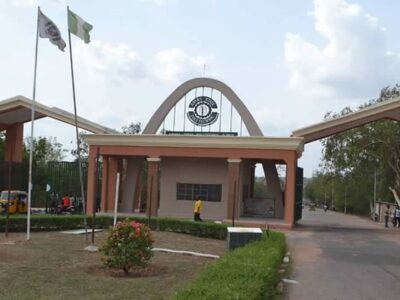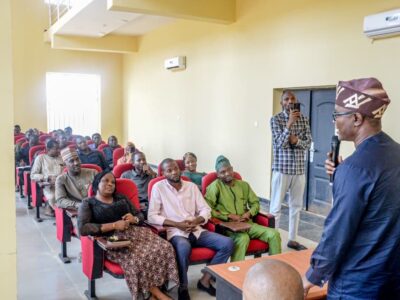By Usman Aliyu
The Health of Mother Earth Foundation (HOMEF) on Friday led a campaign rally in Edo to raise awareness about the dangers of introducing Genetically Modified Organisms (GMOs) into Nigeria’s food system.
The campaign took place in collaboration with the GMO-Free Nigeria Alliance and members of the Edo Civil Society Organisations (EDOCSO).
The rally, which started from the National Museum at Ring Road, Benin, made its way to the Edo House of Assembly, state office of the Federal Ministry of Agriculture and Food Security, and to the Government House.
At the Government House, the Chief Security Officer to the Governor, Solomon Oseghale, received a petition against the introduction of GMOs on behalf of the state government.
The petition called on the government to reconsider its decision to approve GMOs and to prioritise the health and well-being of Nigerians.
The Executive Director of HOMEF, Dr Nnimmo Bassey, said the rally took place simultaneously in Rivers, Katsina, Plateau, Oyo, Lagos, Cross Rivers, Enugu, Jigawa states and the FCT.
According to him, Nigeria does not need GMOs to address food insecurity.
He asserted that the design of the genetically modified crops does not support local economic growth but promote dependency on corporate seed supply.
“In September 2024, the National Cotton Association of Nigeria (NACOTAN) was reported to have recorded no significant increase in yields when compared to the local seed varieties.
“Instead, the introduction of GM cotton seeds over four years ago, yield per hectare has remained about the same.
“Also, the farmers noted that no other plant has been able to germinate on the farmlands where the GM seeds were planted, even after four years.
“This confirms the concerns regarding loss of biodiversity and soil degradation due to release of genetic material (proteins) into the soil which would not ordinarily occur,” he said.
Bassey decried that farmers were not able to replant the GM seeds after harvest due to declining yields.
He said farmers were encouraged to continuously purchase the seeds every new season from corporate entities.
He said this reflected neo-colonialism and corporate capture of our food system -something we shouldn’t take lightly.
On his part, Ifeanyi Nwankwere, National Co-coordinator of the GMO-Free Nigeria Alliance, noted that GMOs approved in Nigeria, so far were not currently being labelled.
Heb said Nigeria’s socio-economic context would not allow labelling to be effective considering how food was sold in cups and basins in open markets where majority of our people shop from.
Nwankwere noted that the biosafety regulatory system in Nigeria was not designed in a way that assures safety with regard to GMOs.
Similarly, Mr Agho Omobude, Coordinator of the Edo Civil Society Organisations (EDOCSO), said the rally aimed to educate the public about the risks associated with GMOs.
Omobude stressed that genetically modified foods are poisonous and pose a significant threat to the health and well-being of Nigerians.
He dismissed the claim that GMOs could ensure food sufficiency, describing it as a lie and a ploy to colonise Nigeria’s food system.
He bemoaned the approval of 14 genetically modified foods in Nigeria, which had been a staple in all households over the years.
Mr Cadmus Atake-Enade of the HOMEF advocated legislation that would outlaw the sale of genetically modified foods in Edo and Nigeria at large.
He expressed concerns that some super markets in the state were reportedly selling the products without providing the customers with information about them.
The News Agency of Nigeria (NAN) reports that the rally featured distribution of leaflets containing anti-GMO information.
The campaigners also displayed placards with various inscriptions such as, “Nigerians reject GMOs”, “#FoodnotPoison”, “Food Should Not Be Grown In A Lab”, “Support Small Scale Farmers”, “What We Eat Must Not Eat Us”, among others. (NAN)










Comments